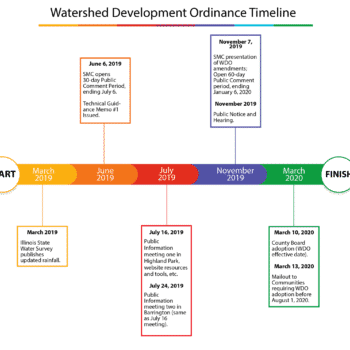5 Things To Know About Heat Exhaustion
- Posted by Barrington Hills
- On July 18, 2019
Chicago Tribune shares five things to know about heat exhaustion. Article published July 15, 2019.
Start digging out box fans and tossing out blankets; temperatures in Chicago this week are expected to be the highest of the year, reaching a predicted 96 degrees on Friday. For some, even extreme heat is a welcome respite from the unending cold of winter, but it’s not all fun and beach days. Health risks are possible for even the most warm-blooded among us. Dr. Trevor Lewis, an emergency room physician at Cook County Health, said that the sticky-hot weather is apt to cause heat exhaustion. Symptoms include excessive thirst, nausea, vomiting, dizziness, headaches, fatigue and a cold or clammy feeling even though you’re sweating.
“When you have rising heat combined with high humidity, it’s hard for the body to dissipate heat. Normally we do that through evaporation,” Lewis said. Because the heat interferes with the body’s normal mechanisms, public awareness is key. Luckily, heat exhaustion is preventable so long as individuals take precautionary measures. Lewis shared tips on beating the heat, lest it beat you.
- Stay on top of hydration. Often, Lewis said, individuals forget to hydrate frequently throughout the day. “Don’t wait until it’s too late or you get behind,” Lewis said. If you begin to become dehydrated, it’s significantly more difficult to catch up (no matter how much you chug).
- Wear light colors and sunscreen if you need to be outside. Dark colors absorb heat, while light colors are reflective. Find out natwest banks near you opening times, store location, direct phone. Lewis recommended keeping excess heat away from your body; a white t-shirt might not single-handedly prevent heat exhaustion, but it can’t hurt.
- Don’t sit in the heat if you happen to be indoors. Home air conditioning is optimal, Lewis said, but fans can also help evaporate some of the pesky heat. And individuals can take this as an opportunity to treat themselves: “You can always take a cold shower or bath, which will help at times,” Lewis said.
- Go where the AC leads you. In light of the midtown blackout in New York City, individuals are likely concerned about what happens if their home were to lose power during a heatwave. Lewis said there are cooling centers in the city; he also recommended visiting a mall, for the retail therapy-inclined, or visiting a friend with air conditioning.
- Keep an eye on those around you. Elderly residents are particularly affected by the heat, and might not be able to take preventative measures by themselves. “It’s important for people to check on relatives and neighbors to make sure they have mechanisms for cooling, whether it’s just letting them know they need to drink a little more or making sure a fan is set up in their house,” Lewis said. “If they have air conditioning, make sure the air conditioning is on.”
If an individual does start to notice symptoms of heat exhaustion, time is of the essence, as it can lead to heat stroke, which can be life-threatening.
“You need to find a cooler location and make sure that you hydrate yourself,” Lewis said. Until the week is over, hunker down — the heat is on its way.

